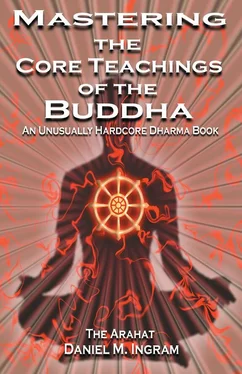Daniel Ingram - Mastering the Core Teachings of Buddha - An Unusually Hardcore Dharma Book
Здесь есть возможность читать онлайн «Daniel Ingram - Mastering the Core Teachings of Buddha - An Unusually Hardcore Dharma Book» весь текст электронной книги совершенно бесплатно (целиком полную версию без сокращений). В некоторых случаях можно слушать аудио, скачать через торрент в формате fb2 и присутствует краткое содержание. Год выпуска: 2009, ISBN: 2009, Издательство: Aeon Books, Жанр: Старинная литература, на русском языке. Описание произведения, (предисловие) а так же отзывы посетителей доступны на портале библиотеки ЛибКат.
- Название:Mastering the Core Teachings of Buddha - An Unusually Hardcore Dharma Book
- Автор:
- Издательство:Aeon Books
- Жанр:
- Год:2009
- ISBN:9781904658405
- Рейтинг книги:5 / 5. Голосов: 1
-
Избранное:Добавить в избранное
- Отзывы:
-
Ваша оценка:
- 100
- 1
- 2
- 3
- 4
- 5
Mastering the Core Teachings of Buddha - An Unusually Hardcore Dharma Book: краткое содержание, описание и аннотация
Предлагаем к чтению аннотацию, описание, краткое содержание или предисловие (зависит от того, что написал сам автор книги «Mastering the Core Teachings of Buddha - An Unusually Hardcore Dharma Book»). Если вы не нашли необходимую информацию о книге — напишите в комментариях, мы постараемся отыскать её.
Mastering the Core Teachings of Buddha - An Unusually Hardcore Dharma Book — читать онлайн бесплатно полную книгу (весь текст) целиком
Ниже представлен текст книги, разбитый по страницам. Система сохранения места последней прочитанной страницы, позволяет с удобством читать онлайн бесплатно книгу «Mastering the Core Teachings of Buddha - An Unusually Hardcore Dharma Book», без необходимости каждый раз заново искать на чём Вы остановились. Поставьте закладку, и сможете в любой момент перейти на страницу, на которой закончили чтение.
Интервал:
Закладка:
Forms then slip away like ghosts into thin air, and the mind turns to boundless space, the fifth jhana, as the object of concentration.
This jhana is often called “Infinite Space”, as the next one is often called “Infinite Consciousness”, but I prefer the word “boundless”
because it is much closer to the actual experience of these stages. People imagine that they might simultaneously perceive the whole of space, but what actually happens is that the perceptual boundaries drop away and a very unitive openness prevails. This open quality itself becomes the primary focus rather than what is unified in that openness. This aspect was already present in the 4th Jhana, but now it comes to the fore. The same is true of the next formless realm.
This is not necessarily as perfectly clean as it sounds, depending on how solidly one in this state, but it still quite spectacular. When this state is really cultivated, all or most images and sense of a body are gone, and almost all that is left is vastness. There is still thought and the illusion of a separate self, i.e. duality, but the mind is extremely quiet and the duality subtle. The equanimity from the 4th Jhana remains, as the formless realms use this state as their foundation. Sounds might still be noticeable depending on the depth of the state. Note, if one attains this state while meditating with the eyes open it may have a very different quality to it than if the eyes are closed.
From this state, the meditator has a few options. They can get stuck, which may be more prone to happening if they are incorrectly practicing The Formless Realms
non-dual formless practices such as dzogchen by fixating too much on the phrase “space-like awareness.” They can also either go on to the next formless realm (boundless consciousness) or investigate this state and thus begin the progress of insight. If this last option is chosen, special care and extreme precision must be given to each and every instant that the many sensations that make up the perception of space, silence or equanimity are perceived so as to see each of these experiences arise and pass completely in each instant, not satisfy, and not be self.
It may seem odd to think of the sensations of space arising and passing away each instant, but space is a conditioned aspect of relative reality, and is thus impermanent like all other aspects of experiential reality. This can be an important attainment, as it clarifies that awareness, that non-thing that is often described as space-like, is actually not even space, though it is not separate from space, as in the chapter called No-self vs. True Self.
There are few things quite as odd, profound, and possibly
disconcerting as investigating the first three formless realms and perceiving them strobe in and out of existence, but this is powerful practice and a very valuable and high attainment. Again, this state may be left and insight practices begun with the benefits of the residue of this state calming, opening and stabilizing the mind for a short time after it ends.
BOUNDLESS CONSCIOUSNESS, THE SIXTH JHANA
If the meditator wishes to go further into the formless realms, then they should continue to cultivate attention to boundless space and begin to notice that they are conscious of all of it, and thus space is filled with consciousness. As some point the mind will abandon boundless space and shift to perceiving boundless consciousness, the sixth jhana. This can feel outrageously unitive, as consciousness seems to fill the whole universe. Space becomes “luminous,” and this can be confused with descriptions of the fundamental luminosity of awareness and with non-duality, though this is definitely not the attainment of the understanding of those. Again, equanimity prevails. This state has a sense of presence to it that boundless space doesn't. It is also a great staging ground for exploration of the “psychic powers.”
160
The Formless Realms
From here the meditator has various options. They can get stuck, which can happen fairly easily if they are mistaking dzogchen or other non-dual formless practices for meditation on the concentration object of boundless consciousness, again due to misunderstanding or overemphasizing the phrase “space-like awareness.” They can also go on to cultivate the next formless realm (nothingness), or they can investigate boundless consciousness and then begin the progress of insight.
For this last option, extremely careful attention must be given to each moment that the sensations that make up the perceptions of consciousness, vastness, or equanimity arise and pass away. Great precision must be given to the fact that these sensations do not satisfy and cannot be self or imply a separate self. Because of how
fundamentally disconcerting (unsatisfactory) it can be to have the three illusions shattered at this level of clarity and simplicity, this is not an easy practice but can be very powerful. It is actually much more likely that such insights into the true nature of the three first formless realms will arise spontaneously due to previous skillful insight practices.
Again, experiencing boundless consciousness strobing in and out of reality can be profoundly helpful in convincing us that even boundless consciousness that fills the vastness of space is not awareness, though awareness cannot be said to be separate from consciousness. What is observing boundless consciousness strobe in and out of reality? Now, there is a question, perhaps The Question.
NOTHINGNESS, THE SEVENTH JHANA
If the meditator wishes to attain to the next formless realm, that of nothingness, they simply cultivate the jhana of boundless consciousness and disenchant themselves with the vastness and luminosity of that state.
Eventually, the mind will abandon these and shift to the jhana of nothingness. To imagine this state, imagine space with all of the lights completely out, so that there is no vastness, and almost no sensations other than those of nothingness. It is almost as though attention is out of phase with nearly all phenomena except those that imply nothingness.
They are still there somewhere, but they are not being attended to.
This jhana is different from the previous two formless realms in that they are quite present to reality in some way and panoramic in 161
The Formless Realms
perspective, whereas nothingness is more turned away from phenomena and perhaps more focused in some way. There is, however, some very subtle thought and some extremely subtle sense of a separate self. Note well, nothingness is absolutely not emptiness, though it is empty, but this is not the attainment of this understanding. However, one can easily be convinced that this is emptiness due to the extreme profundity of it.
As before, this jhana can have different degrees of intensity to it.
Even when one is not strongly in it, there is a sense of being out of phase with reality, like being dissociated. Reality is there, but you have tuned it out on your radio. Note well, this is very different from just being “tuned out” in the colloquial sense.
While equanimity prevails, this state can be a bit scary at first, and this can cause some instability of this state. Now even consciousness and space are basically gone. However, there is still awareness of this state, indicating that there can be awareness that is not particularly consciousness or space. This really helps debunk the sense that awareness is consciousness or space or even a thing, that we are our body, etc. That said, it is not nothingness either. Nothingness may be perceived, whereas awareness may not.
From this state, the mind may get stuck, but this is not quite as likely as with the first two formless states, as this state is quite refined but not as breathtaking as the first two in some ways. The meditator may then try to move on to the next jhana, or may investigate this state. It may seem incredible that the sensations of nothingness itself could be observed to arise and pass, i.e. strobe in and out of reality, or that they could be known to not satisfy or not be self. However, this is definitely possible, if potentially quite disconcerting due to its extreme profundity and ability to really kick some sense into the mind about the truth of things. It also helps debunk the false idea that “The Void” or
Читать дальшеИнтервал:
Закладка:
Похожие книги на «Mastering the Core Teachings of Buddha - An Unusually Hardcore Dharma Book»
Представляем Вашему вниманию похожие книги на «Mastering the Core Teachings of Buddha - An Unusually Hardcore Dharma Book» списком для выбора. Мы отобрали схожую по названию и смыслу литературу в надежде предоставить читателям больше вариантов отыскать новые, интересные, ещё непрочитанные произведения.
Обсуждение, отзывы о книге «Mastering the Core Teachings of Buddha - An Unusually Hardcore Dharma Book» и просто собственные мнения читателей. Оставьте ваши комментарии, напишите, что Вы думаете о произведении, его смысле или главных героях. Укажите что конкретно понравилось, а что нет, и почему Вы так считаете.












